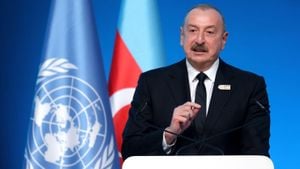British Prime Minister Keir Starmer recently met with Chinese President Xi Jinping at the G20 summit held in Rio de Janeiro, marking the first direct conversation between the leaders of the UK and China since 2018. During the meeting, Starmer underscored the significance of establishing strong and durable ties between the two nations. He harped on the necessity for "consistent, durable, and respectful" relations, which he believes are imperative amid the changing global political climate.
Starmer has taken the helm of the UK just months prior, with ambitions to mend what he sees as frayed relationship with China. His immediate agenda includes fostering cooperation on global issues, particularly emphasizing trade, economic stability, and climate change. Xi echoed this sentiment, expressing confidence in the potential for collaboration between the two nations, provided they work toward deepening political trust.
One of the pivotal moments of the discussion was Starmer's candid acknowledgment of sensitive issues, such as the plight of Jimmy Lai, the British national and pro-democracy activist imprisoned under Hong Kong's contentious national security law. Lai's situation has drawn international scrutiny, especially as reports surfaced about his deteriorated health during his incarceration. Starmer made it clear to Xi his administration's concern over Lai's condition, urging attention to fundamental human rights issues.
Starmer’s meeting with Xi juxtaposes sharply against the backdrop of deteriorated UK-China relations, exacerbated by factors such as China's close ties with Russia during its war in Ukraine and rising concerns over Chinese espionage and human rights records. This period has witnessed accusations against China from various UK lawmakers, leading to heightened calls for the UK government to adopt more stringent policies toward Beijing.
Despite these challenges, Starmer aims for progress. He proposed arranging full bilateral meetings either in London or Beijing, with hopes to bring UK Finance Minister Rachel Reeves to Beijing next year to discuss economic cooperation.
Starmer’s remarks come as the UK navigates its position as "a predictable, consistent, sovereign actor committed to the rule of law", attempting to reestablish itself diplomatically after years of strained relations under previous administrations. He stressed the importance of avoiding surprises, indicating his desire for stable dialogue channels.
Notably, as journalists were present for the opening discussions, tension arose when Starmer brought up the issue of human rights, with Chinese officials abruptly ushering British press out of the room. This abrupt removal of media personnel has raised eyebrows and highlighted the delicate interplay of diplomacy and transparency between the two nations.
The broader geopolitical picture, including the looming prospect of Donald Trump's second term and his expected hardline stance on China, adds to the complexity of Starmer's efforts. Xi pointed out the necessity for both nations to shoulder responsibilities amid global challenges, underscoring the potential repercussions of their relationship on the broader international stage.
Starmer's approach has drawn mixed reactions back home. While some support his push for pragmatic engagement, others, including members of his own party, are wary, citing the need for strong stances on human rights. Sir Iain Duncan Smith, former Conservative Party leader, criticized Starmer's approach, arguing it may be perceived as weakness by Xi, and there's substantial risk tied to entering what he describes as agreements with authoritarian regimes.
Public figures and human rights organizations have expressed similar apprehensions. The chief executive of Amnesty International UK stressed the importance of voicing human rights concerns, particularly relating to the treatment of activists and minorities under the Chinese regime. Constituents have questioned whether Starmer's lenient approach could compromise ethical standards, especially with instances like Lai's trial drawing near.
This summit is pivotal, not just for UK-China relations but for broader diplomatic efforts involving Western nations and their strategies toward China amid rising global tensions. Starmer's tenure as PM may very well be defined by how effectively he can strike the balance between engaging with Beijing politically and upholding the UK's commitments to human rights.
Calls for future discussions are not exclusively focused on contentious topics; areas like climate change and health collaborations were highlighted as pivotal for both nations. Facing the prospect of global challenges like environmental crises, leaders recognize the need for cooperative actions beyond bilateral feuds. Starmer's administration hopes to position the UK as a proactive agent for international synergy.
The outcomes of Starmer's meeting with Xi will reverberate beyond immediate discussions. The ripple effects could influence how other nations perceive their relationships with China, especially as the world braces itself for the ramifications of upcoming elections and external pressures from various global powers.
At this juncture, the UK faces the challenge of rejuvenation—both economically and diplomatically. Starmer's engagement with Xi embodies potential avenues forward, punctuated by dialogue on trade, human rights, and climate goals. But the road to rebuilding relations is riddled with obstacles, and how the Labour government navigates this terrain will significantly shape the narrative of UK-China relations moving forward.



